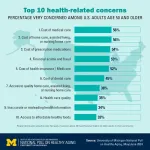(Press-News.org) Long Beach, Calif. – May 2, 2024 – New data from the CALORI Cardiac Catheterization trial shows significant improvement in patient well-being and satisfaction without compromising safety after implementation of a liberal non-fasting strategy prior to a cardiac catheterization procedures. The late-breaking results were presented today at the Society for Cardiovascular Angiography & Interventions (SCAI) 2024 Scientific Sessions.
More than one million cardiac catheterizations are performed each year in the U.S. to diagnose heart problems. The risk of complications is low, but issues such as bleeding, pain, infections, or blood clots could occur. In addition, routine pre-procedural fasting remains the standard of care, despite a lack of robust evidence to support this practice.
The CALORI Cardiac Catheterization trial focuses on inpatients undergoing elective or urgent cardiac catheterization procedures. This single-center, randomized trial investigated the impact of fasting after midnight versus unrestricted oral intake prior to cardiac catheterization. The primary endpoint assessed pre-procedural patient satisfaction levels (scaled 0-5, 0 signifying absence of variable and 5 the most extreme form) regarding hunger, fatigue, anxiety, and nausea. Additionally, a composite well-being score, incorporating hunger and fatigue, was utilized. Secondary endpoints encompassed post-procedural satisfaction and the occurrence of peri-procedural adverse events such as emesis, aspiration, or intubation.
Among the 198 patients analyzed (65% male and 42% Black), non-fasting patients showed significantly better composite pre-procedural well-being scores of 2.4 ± 2.4 compared to 6.0 ± 2.5 for those who were withheld from fluids or solids (Nil Per Os, NPO) (p<0.001). Individual scores for hunger (0.9 ± 1.5 vs. 3.7 ± 1.5, p<0.001), fatigue (1.5 ± 1.6 vs. 2.3 ± 1.8, p<0.001), and nausea (0.1 ± 0.5 vs. 0.5 ±1.2, p=0.006) were also significantly better in the non-fasting arm. Post-procedural satisfaction was significantly higher in the non-fasting group ((0.3 ± 0.7 vs. 1.0 ± 1.3, p<0.001). Time from most recent oral intake to procedure start averaged 148 minutes for the non-fasting and 970 minutes for the NPO strategy (p<0.001). Adverse events did not differ between groups.
“Just as our techniques and technology for cardiac catheterization have evolved, so should our approach to pre-procedure management,” said Dr. Brian Mitchell, interventional cardiology fellow at Virginia Commonwealth University, and lead author of the study. “Few studies have prospectively explored this strategy in such a diverse patient population, and with such liberal non-fasting allowances, making it the most comprehensive and generalizable study on this topic to date. Given our findings, we hope that providers will limit pre-procedural fasting to those patients at high risk of aspiration or conversion to general anesthesia.”
Session Details:
“Cardiac Catheterization with Liberal Oral Intake: The CALORI trial”
Thursday, May 2, 2024; 9:59-10:06 AM PT
Long Beach Convention Center, 104A, First Level
###
About Society for Cardiovascular Angiography & Interventions (SCAI)
The Society for Cardiovascular Angiography & Interventions, established in 1978, stands as the primary nonprofit medical society dedicated to representing invasive and interventional cardiology. SCAI's mission is to guide the global interventional cardiovascular community by fostering education, advocacy, research, and upholding standards for quality patient care. For more than 40 years, SCAI has exemplified professional excellence and innovation worldwide, cultivating a reputable community of over 4,500 members committed to advancing medical science and providing life-saving care for individuals, both adults and children, affected by cardiovascular disease. For more information, visit https://scai.org/.
For more information about the SCAI 2024 Scientific Sessions, visit https://scai.org/scai-2024-scientific-sessions. Follow @SCAI on X (formerly Twitter) and on LinkedIn for the latest heart health news and use #SCAI2024 to follow the latest discussions.
END
Long Beach, Calif. – May 2, 2024 – Final 12-month data from the EXACT trial demonstrates safety and efficacy results for a vascular endothelial growth factor (VEGF) gene therapy treatment for patients who have advanced coronary artery disease (CAD). The late-breaking results were presented today at the Society for Cardiovascular Angiography & Interventions (SCAI) 2024 Scientific Sessions.
CAD, also known as coronary heart disease or ischemic heart disease, affects about 20.5 million U.S. adults – making it the most common type of heart disease in the ...
Long Beach, Calif. – May 2, 2024 – New data demonstrated that a left main (LM) bifurcation-specific novel scoring system (LM V-RESOLVE), based on three simple baseline angiographic findings, could help to rapidly discriminate lesions at risk of side branch (SB) occlusion during LM bifurcation percutaneous coronary intervention (PCI) – reducing risk during the procedure. The results from the prospective trial were presented today as late-breaking science at the Society for Cardiovascular Angiography & Interventions (SCAI) ...
BALTIMORE, May 2, 2024: Bacterial Vaginosis (BV) affects about one-quarter of reproductive-age women and is linked to adverse health outcomes, such as increased HIV risk. Yet for decades, BV treatment in the United States has largely relied on antibiotics, and BV recurrence is common following antibiotic therapy.
Now, two European clinical trials have shown limited success with a different type of medication used to treat BV called dequalinium chloride (DQC). DQC—an antiseptic—has been in use for several decades in countries throughout Europe as an alternative treatment for BV. It is not currently approved by the U.S. ...
Recent reports of NASA’s James Webb Space Telescope finding signs of life on a distant planet understandably sparked excitement. A new study challenges this finding, but also outlines how the telescope might verify the presence of the life-produced gas.
The UC Riverside study, published in the Astrophysical Journal Letters, may be a disappointment to extraterrestrial enthusiasts but does not rule out the near-future possibility of discovery.
In 2023 there were tantalizing reports of a biosignature gas in the atmosphere of planet K2-18b, ...
Long Beach, Calif. – May 2, 2024 – New data demonstrate the superiority of radial arterial access compared to femoral arterial access for coronary interventions. Findings showed radial access was associated with lower rates of in-hospital mortality, major access bleeding, and other major vascular complications compared with femoral access. The late-breaking results were presented today at the Society for Cardiovascular Angiography & Interventions (SCAI) 2024 Scientific Sessions.
Historically, femoral arterial access, through the groin, for percutaneous coronary intervention (PCI) was the standard. Radial access, or ...
From medical and dental care to medications, insurance and nursing homes, health-related costs weigh heavily on the minds of older Americans of all backgrounds, a new poll suggests.
Asked to rate their level of concern about 26 different health-related topics for people over 50 in their community, five of the six issues that the most people cited as very concerning involved health costs.
The sixth – financial scams and fraud – also had to do with money.
Those same six topics rose to the top no matter what ...
The alarming rates of biodiversity loss worldwide have made clear that the classical way of governing biodiversity recovery based on protected areas and programmes for the protection of endangered species is not enough. To tackle this, almost 200 countries committed to the active ‘mainstreaming’ or integration of biodiversity targets into policies and plans across relevant sectors. However, research led by Utrecht University and UFZ Helmholz Centre for Environmental Research suggests that this has until now been largely ineffective due to non-binding commitments, ...
As COVID-19 becomes endemic, an important group of people who continue to require vaccination is future birth cohorts of children. Yet, in the face of ever-changing variants, as well as the waning of antibodies with time after each dose, key questions remain: What is the threshold of immune response against SARS-CoV-2 needed to protect against COVID-19 and how many doses of mRNA vaccination are required to reach that threshold?
Researchers answered this question in a joint study conducted by the NUS Yong Loo Lin School of Medicine (NUS Medicine) and Duke-NUS Medical School. With parental consent ...
People with Lower Income and Pre-Existing Conditions at Greater Risk of STEMI in the United States
Women, Black, and Hispanic Patients Up to 25% Less Likely to Receive Treatment for Heart Attacks Compared Men and White Patients
Long Beach, Calif. – May 3, 2024 – New data focusing on heart attack, specifically ST‐segment–elevation myocardial infarction (STEMI), uncovered socio-economic, racial, and gendered disparities associated with greater risk and are less likely to receive certain procedures. The data were presented today at the Society for Cardiovascular Angiography & Interventions (SCAI) 2024 Scientific Sessions.
STEMI, caused by ...
Long Beach, Calif. – May 4, 2024 – A nationwide observational analysis of patients with aortic stenosis (AS) and cardiogenic shock (CS) who underwent transcatheter aortic valve replacement (TAVR) or surgical aortic valve replacement (SAVR) determined that patients who underwent TAVR had lower in-hospital complications and resource utilization compared with SAVR. The results were presented today at the Society for Cardiovascular Angiography & Interventions (SCAI) 2024 Scientific Sessions.
As many as 300,000 people in the United States are diagnosed with AS every year. It predominantly affects those ...








